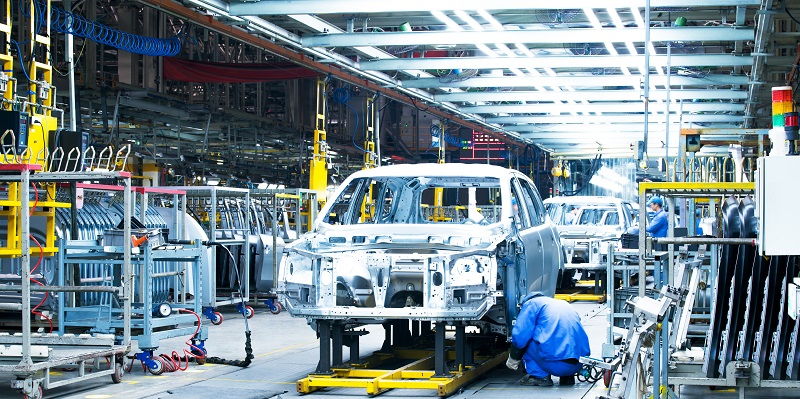In an era of rapid technological advancements, the integration of Industry 4.0 principles has brought about a transformational change in automotive manufacturing. The Internet of Things (IoT), robotics, artificial intelligence (AI), and data analytics have become pillars of innovation, revolutionizing traditional manufacturing processes. This article delves into the role of automation in enhancing efficiency, precision, and productivity in automotive manufacturing. Furthermore, it explores the need for flexibility to meet the evolving demands of the industry and how incorporating automation, specifically IONA from INSPHERE, enables manufacturers to achieve a higher level of flexibility and customization while maintaining efficiency and quality.
Role of Automation in Automotive Manufacturing
Automation has emerged as a key driving force behind the transformation of the automotive manufacturing sector. By integrating IoT, robotics, AI, and data analytics, manufacturers have gained the ability to streamline operations, reduce human error, and optimize productivity. Automated systems now play a significant role in achieving enhanced efficiency and precision throughout the manufacturing process. From assembly lines to quality control, automation brings numerous benefits, creating a streamlined and effective manufacturing ecosystem.
The Need for Flexibility in the Automotive Industry
In today’s fast-paced world, the automotive industry faces ever-evolving demands and changing market dynamics. To remain competitive, manufacturers must possess the flexibility to adapt quickly and meet these constantly shifting requirements. Customization has become a driving force behind consumer satisfaction, and manufacturers are increasingly recognizing the need to adopt flexible manufacturing processes to meet market demands. This shift towards flexibility allows for enhanced adaptability, shorter production cycles, and the ability to cater to individual customer preferences.
Incorporating Automation for Flexibility and Customization
To achieve flexibility and customization, automotive manufacturers are turning to automation solutions. By incorporating automation into the manufacturing process, manufacturers can achieve a higher level of adaptability, agile production planning, and efficient integration of diverse components and options. Automation enables rapid adaptation to changing market demands, reduces lead time, and enhances production efficiency. It empowers manufacturers to produce vehicles that align with customer expectations while minimizing waste and errors.
The Importance of Metrology in Flexible Manufacturing
A critical aspect of successful and flexible manufacturing lies in the integration of a robust metrology system. Metrology, the science of measurement, ensures accuracy, reliability, and consistency in the manufacturing process. By incorporating a comprehensive metrology system into the production line, manufacturers can assess the quality of components, identify deviations, and optimize processes. This ensures that products meet stringent quality standards while maintaining productivity and efficiency.
IONA: Enabling Flexible Manufacturing
IONA, developed by INSPHERE, introduces a game-changing solution to flexible manufacturing. As a scalable network of sensors providing metrology-grade data for industrial robots, IONA has become a critical enabler of flexibility in the automotive industry. Its value addition is witnessed in three key stages: Commissioning, Process Performance, and Process Monitoring.
Commissioning is a crucial phase in the manufacturing process, where IONA provides accurate measurements and ensures optimal calibration of robotic systems. By automating this traditionally complex and time-consuming task, IONA eliminates human-induced errors and reduces system setup time.
Process performance involves monitoring the performance of robotic systems during operation. With IONA, manufacturers can assess the functionality and accuracy of robots in real-time, optimizing their performance and identifying any deviations or abnormalities.
Process monitoring is crucial for ongoing quality control. IONA continuously collects metrology data, allowing manufacturers to monitor the quality of components, detect variations, and prevent defects early in the production process. This ensures consistent and high-quality output while minimizing waste and rework.
Mitigating Pitfalls in Automated Manufacturing
By integrating a comprehensive metrology system like IONA into the blueprint of the production line, manufacturers can mitigate the pitfalls traditionally associated with automating commissioning, process performance, and process control. IONA acts as a reliable partner, providing accurate measurement data that enables manufacturers to remain competitive, efficient, and adaptable in a rapidly evolving industry.
The automotive industry is undergoing a remarkable transformation driven by principles of Industry 4.0 and automation. Automation, incorporating IoT, robotics, AI, and data analytics, has become a crucial element in enhancing efficiency and productivity. At the same time, flexibility and customization have emerged as key requirements to meet evolving customer demands and maintain competitiveness. The integration of a robust metrology system, such as IONA, enables manufacturers to take advantage of the benefits of automated flexible manufacturing. With IONA, manufacturers can optimize commissioning, process performance, and process control, ultimately ensuring sustained competitiveness, efficiency, and adaptability in the dynamic world of automotive manufacturing. This revolution in the industry heralds a new era of production excellence, promising a future where manufacturers can seamlessly adapt and cater to the ever-changing needs of the market.

